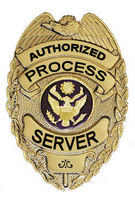What’s A Process Server And What Do They Do?
 A registered process server is an individual that is certified and experienced in delivering (serving) legal papers to individuals and businesses, known as defendants or parties. When a criminal or civil case goes to court, the attorneys will alert the parties involved via legal documents. The process server, upon getting the documents from the lawyer, continues to get those papers to the individual.
A registered process server is an individual that is certified and experienced in delivering (serving) legal papers to individuals and businesses, known as defendants or parties. When a criminal or civil case goes to court, the attorneys will alert the parties involved via legal documents. The process server, upon getting the documents from the lawyer, continues to get those papers to the individual.
When regarding registered process servers, these are generally servers that are registered to serve within a certain county or area of their state, having actually been licensed to do so.
Becoming a process server can be a simple process. Most states call for a server to be trained and licensed by either a lawyer or an accepted veteran server. Each state has a process server association or state board that regulates the laws or process for that state. They must also have a list of approved training and courses. State laws and regulations will also determine the level of background clearance one can have in order to serve papers.
The main duty of a process server is to deliver actions of a pending case to the party or parties involved. Process servers can additionally be asked to execute other jobs related to service, consisting of monitoring of subjects or executing of background checks. It is up to the individual server whether to offer these solutions.
Cases differ and the lawyers representing each side will provide the person’s identification and address where they think they can be found for delivery. After the case has been filed in its respective court, the attorneys involved will provide a court copy of the case with the parties to be notified to the server. The server will then deliver the alert to the individual they are directed to. The sort of case factors into the time rate of delivery.
Citations and requests tend to be routine and permit up to a couple of months to find and serve the documents. Subpoenas to produce documents typically have a smaller time span for delivery. Temporary restraining orders and writs of garnishment usually demand service within three week days due to the nature of these sorts of cases.
If you are interested in becoming a registered process server, learn about the requirements for your state and study the laws of civil procedure. Serving legal documents is not the most glamorous job, however it is always in demand and filings of new civil cases continue to grow every year.